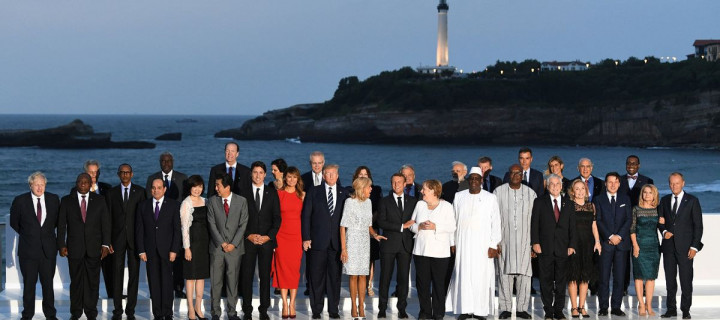
Need for coordinated action by G7 leaders on forced labour
Leaders representing half the global economy meet together this week as countries across the world are struggling with the Covid-19 pandemic and its far reaching aftermath. It is imperative that we build back better, greener, and fairer. Yet there are an estimated 25 million people in the world in forced labour, 16 million of whom are in the private economy, and recent evidence suggests that the number may be rising as a result of both the pandemic and climate change. Addressing forced labour in G7 economies and supply chains should be a pillar of building back better and improving a values-based global economy.
Forced labour permeates global supply chains of commodities, goods and services. According to the 2018 Global Slavery Index, forced labour taints over $350bn of goods in technology, apparel, seafood, medical supplies, cocoa, cotton, palm oil, coffee and sugar industries annually. Companies and financial institutions profit from unchecked forced labour, and while they face significant challenges in identifying risks of forced labour in complex and multi-layered supply chains, they also need further incentives from governments to overcome those challenges. It is estimated that profits from modern slavery exceed $150bn per year, moving through the global financial system and spurring massive corruption and organised crime. The use of forced labour is also connected to serious environmental destruction and unsafe, unregulated migration.
There is rightly considerable concern about the human rights situation that is leading to state-sponsored forced labour in China. This requires a coordinated and urgent response. Forced labour also exists throughout the world, including in every G7 nation, with vulnerable people forced into work through debt bondage, deception or menace. We must be united in committing to address these challenges at home and abroad. Tackling forced labour is the right thing to do and promotes inclusive economic development and contributes to the educational and economic advancement of women and girls.
As the first meeting of the G7 since the start of the coronavirus pandemic, the upcoming Summit in Cornwall provides a critical opportunity for the G7 to demonstrate the political will to rebuild the global economy free from modern slavery by making commitments to align policies and to resource coordinated action against forced labor.
G7 nations should create a race to the top to eliminate forced labor. G7 governments should begin by using their considerable purchasing power to set the highest standards for public procurement. G7 nations should also harmonise reporting standards and enforcement regimes and collaborate on shared challenges, including through sharing information and intelligence and coordinating enforcement and due diligence.
This is a critical moment for the G7 to elevate and act on this issue and we recommend adopting a series of concrete steps to give momentum to achieving the United Nations sustainable development goal of ending forced labour, modern slavery and human trafficking by 2030, and ending child labour in all its forms by 2025.
Yours sincerely,
Kristen Abrams, Senior Director, Combatting Human Trafficking, the McCain Institute for International Leadership at ASU
Kevin Bales, Professor of Contemporary Slavery, University of Nottingham
Ambassador (ret.) Luis C.deBaca, Senior Fellow in Modern Slavery, Gilder Lehrman Center for the Study of Slavery, Resistance, and Abolition, Yale University
Catherine R. Chen, CEO, Polaris
Julie Francoeur, Executive Director, Fairtrade Canada
Nick Grono, CEO, The Freedom Fund
Christian Guy, CEO, Justice and Care
Yuka Iwatsuki, President and Co-founder, Action against Child Exploitation
Carolyn Kitto, Director, Be Slavery Free
Genevieve LeBaron, Professor of Politics and International Relations, University of Sheffield
Senator Julie Miville-Dechêne, Co-Chair, All-Party Parliamentary Group to End Modern Slavery and Human Trafficking; Senate of Canada
Keisuke Motoki, Head of the Board, Kamonohashi Project
Katherine Mulhern, CEO, Restitution
Jasmine O’Connor OBE, CEO, Anti-Slavery International
Philippe Sion, Managing Director, Forced Labor & Human Trafficking, Humanity United
Alex Thier, CEO, Global Fund to End Modern Slavery
Kevin Thomas, CEO, Shareholder Association for Research & Education
Dame Sara Thornton, UK Independent Anti-Slavery Commissioner
Andrew Wallis OBE, CEO, Unseen
Sharon Waxman, President and CEO, Fair Labor Association


